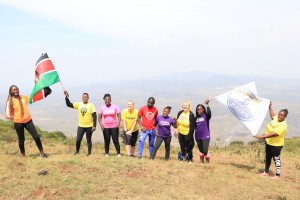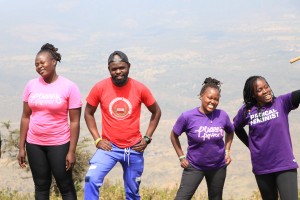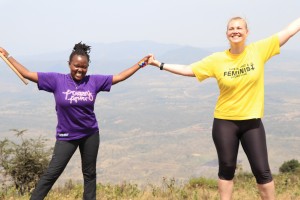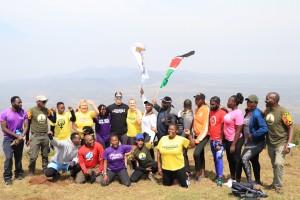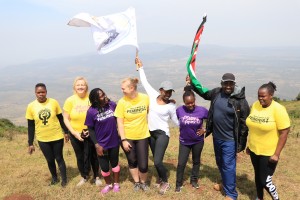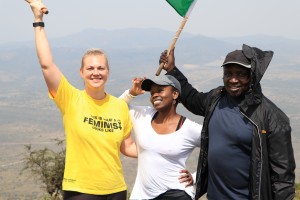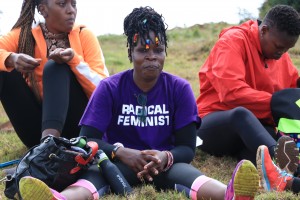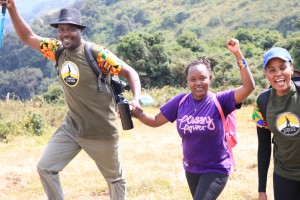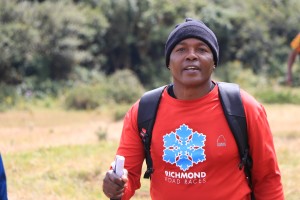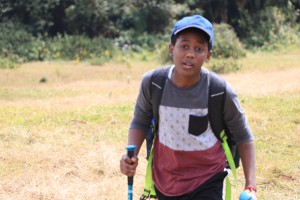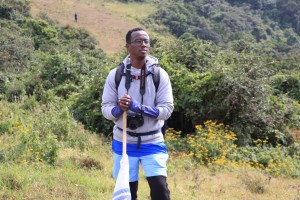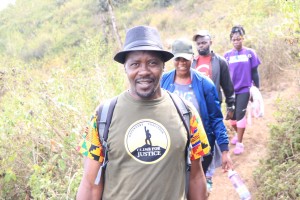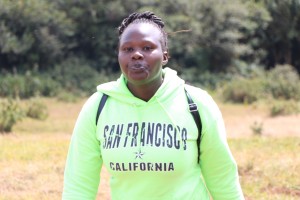
On 12 March 2020, the first case of COVID-19 was recorded in Kenya. To curb the spread of the virus, the Government put in place emergency containment measures including a nationwide dusk to dawn curfew; closure of schools, restaurants and businesses; restrictions on gatherings (including in places of worship); social distancing in public and in transport; mandatory use of face masks and hand washing in public places.
As a result of these restrictions and shutdown of businesses and commercial activity, socio-economic impacts have been severe – particularly on the informal sector, which employs the majority of Kenyans. In response, the Government unveiled an economic assistance package to cushion Kenyans against nancial hardships arising from the COVID-19 crisis, including a fund to assist vulnerable groups. Yet, the impact of the COVID-19 crisis in marginalised communities outside urban areas was not clear. Initial feedback from indigenous organisations and networks indicated that little information on COVID-19 prevention and response had reached indigenous communities, and misinformation was circulating on the spread and impact of COVID-19.
Historically, indigenous communities have been marginalised and experience deep inequalities in access to health care, water and sanitation, education and other basic services. Thus it was unclear how already marginalised communities would be able to comply with Government directives, or take prevention and self-protection measures. There were also indications of increasing gender-based violence in indigenous communities.
For this reason, United Nations Human Rights launched a scoping initiative to document the impact of the COVID-19 crisis on indigenous communities and indigenous women who face multiple forms of discrimination, as groups that are often left behind or marginalised. This initiative is part of engagement to integrate human rights dimensions in the COVID-19 response in Kenya, focusing on inequalities and leaving no one behind. The initiative also built upon existing engagement on indigenous rights, and on sexual and gender-based violence.
REPRESSIVE DISCIPLINARY AND CRIMINAL PROCESSES AGAINST VOCAL STUDENTS AT KENYA’S PUBLIC UNIVERSITIES
Academic institutions are the hub for nurturing and sustaining the right to education. Whilst it is to be expected that universities will always stand for the right to education, including free thought and scientific research, that aspirational role of universities is not being realized considering the worrying pattern of students’ expulsions and suspensions by Kenya’s public universities, mostly on non-academic grounds. The systemic trends eschew the democratic vision of education and rely on the precarious despotic administration model which increases vulnerability of the academic community to recurrent human rights abuse and violations.
Universities Act of 2012 is the legal-policy framework that guide operations of universities in Kenya. According to sections 19 and 20 of the Act, a University Charter is the instrument that establishes and gives legal status and authority to a University to inter alia undertake its academic programmes. The Commission for University Education in Kenya grants the charter to qualified institutions to offer university education and monitors the institutions to ensure compliance with provisions of the Act. The governance of a university is set out in section 35 of the Universities Act and includes a Council, Senate and Management Board. The Vice Chancellor of a University is an ex officio member of a University Council, and is the academic and administrative head of the institution. He/she also has the overall responsibility for the direction, organization, administration and programmes of the University.
Before 2012, the Vice Chancellors of public Universities were solely appointed by the president of the country. This left their tenure of office at the pleasure and mercy of the president. As a result, Vice Chancellors were seen to play partisan roles, predictably siding with the government, often at the expense of the students’ welfare. Although the law changed, and a Vice Chancellor is today appointed by the University Council, questions have remained concerning the independence of the office and the decision making of the university administration particularly around issues touching on management of student affairs and collective political culture.
Kenya’s university students have a rich history of organizing and political mobilization. And as such, especially during the Moi era, 1978-1990s, university students were seen as the unofficial political opposition in the country. As a result, in the 1980s, the government started the wave of arrest of students and their leaders. In fact, several student leaders from the University of Nairobi were arrested and subsequently jailed for their suspected role in the abortive coup in 1982. One of the students detained at the time was the then Chairman of the Students Union of University of Nairobi (SONU), Titus Adungosi who later died in prison. Later, left leaning politician and former legislator, Mwandawiro Mgagha was among the students arrested in 1985 following student clashes with the police at the University of Nairobi. He was subsequently charged with attending an illegal meeting and sent to jail.
In August 2019, the media published an interview with some of the former university students and victims of the suspensions. The students bemoaned the fact that some of their former colleagues were not certain if they would ever resume their studies4 . The extent of student intimidation in the colleges has been far reaching. According to the report, extreme disciplinary measures such as suspensions and expulsions are routinely used by university administrations to silence student dissent or fair articulation of their grievances5 .
Common student grievances have included issues such as lack of adequate student accommodation, poor living conditions, insecurity within campuses, lack of student bursaries and missing marks in student examinations. At the same time, the University Amendment Act, 2016 restructured student’s elections, giving more say to the university administration on the running of student election affairs. According to Section 18 of the amendment Act, elections of the student leaders in the universities are managed by the respective administrations. Student stakeholders have blamed the dearth of effective representation of their affairs on this law because it gives the university administration disproportionate powers in the elections. According to the students, the law took away their right to directly elect their leaders and gave authority to the university administration to create pliable students leadership. The university administrations reportedly vet and approve aspirants for the students leadership positions; carry out the nomination processes and finally, conduct the elections.
This has been a source of tensions between the students and the administration of the universities during student elections. For some of the students, the student unions today can no longer support free student engagements and the pursuit of liberal scholarship in the universities. Rather, the student associations kowtow the administration on the general student issues. The control of the union fees is feared to be another source of the uncanny interests in the students’ leadership. Yet, other than long held student debates on the improvement of the quality of their academic training, students participation in decisions that affect them constitutes another area of lingering misunderstandings between students and the university administration.
As a result, student unrests have become common during the period of student elections. In fact, the election environment is a much-nuanced period for the students as some of them soon appear before the hastily convened disciplinary proceedings that routinely expel or suspend suspected trouble shooters in the aftermath of the elections. What is unfortunate is that the sword normally falls on the outspoken students who may have come into the radar of the administration for totally different reasons. The internal private security providers in the universities have also been known to be involved in giving surveillance and unworthy witness reports on some of the marked students who become easy disciplinary targets wherever the universities clean house after the unrests.
Contrary to the constitutional guarantees to fair hearing, the victims are typically not allowed legal representation whenever they face indictments by administrations or the university disciplinary organs. The charges and counts preferred against them are sometimes only consisting of general youth misbehaviors rather than regulatory offences. But the disciplinary process once put in motion is high handed and ruthless – a show of supervisory powers of the administrators so that the victims serve as examples. The process ends up serving interests other than that of fairness and justice. In order to be safe, the students are better off keeping away from activities that would bring them to controversies of this nature which essentially means that the universities are slowly becoming the sinking ground for critical thinking, far away from the nurseries of vibrant debates and knowledge that the society had come to expect of them.
20 climbers have registered to go across the border to hike Mount Kilimanjaro in support of #ClimbForJustice camapaign.
The team will leave Nairobi on 13 February, where they will embark on an- 8 day expedition which will see them summit point Uhuru. They are to return to Nairobi on 20th February.
This is an incredibly exciting moment for us at Defenders Coalition and our avid supporters. This follows another milestone in 2019 when we successfully summited Mount Kenya on 12th December.
When Defenders Coalition and friends of the Coalition founded the Climb for Justice initiative two years ago, we did so with a simple, but bold idea: to provide the opportunity for everyone, to be part of anchoring human rights in Kenya and beyond by raising funds to establish a home for human rights defenders; inspire Kenyans to defend human rights and celebrate individuals that engage in the noble work of defending human rights and fundamental freedoms.
Since the first hike on Mount Longonot in September 2019, more than 1000 individuals have taken part in various mountain climbing(William Hill, Elephant Hill, Eburru Forest, Kudu Hills, Ngong Hills, Kijabe Hills), where they dedicated every step made to the justice cause and have helped raise six million nine hundred thousand shillings (Kshs 6.9 Million) to set up a safe centre for research, creativity, training and wellness for activists at the forefront promoting human rights for the most vulnerable in our society.
Committing to climb the 5,895 Meters high Mt. Kilimanjaro is not a modest feat. Those who have signed up for the climb demonstrate outstanding commitment to the cause; making personal sacrifices to fundraise for the sustainable promotion of human rights.
One of the climbers who have again signed up is James Mburu Mungai, who is 70 Years young, to highlight the plight of squatters from his village- Mithini, Muranga County.
Defenders Coalition appeals to you to be part of the campaign by sponsoring these champions to climb Mt. Kilimanjaro; and contribute financially towards the overall goal of raising Kshs.50 Million.
Please send your donation through Mpesa Paybill Number: 810896 Account-Your Name & Climber you are sponsoring
Cheques Payable to: National Coalition of Human Rights Defenders-Kenya
Donate a bob for the 147,200 steps that climbers will make up the mountain.

The undersigned organisations strongly condemn the arbitrary arrest of renowned human rights defender Nicholas Opiyo. On 22 December, Opiyo in the company of two other lawyers Odur Anthony and Esomu Simon were arrested at about 4.00pm by plain clothed security agents at Lamaro restaurant in Kamokya suburb, Kampala, and bundled in a vehicle.
The Uganda Police Force in a brief statement confirmed his arrest by a Joint Task team of Security and Financial Intelligence on allegations of money laundering and related malicious acts. It is absurd that the Police force would proceed to arrest him in a highhanded manner, yet investigations are inconclusive. The trio is currently being detained at Kireka Police post.
Nicholas Opiyo is the Executive Director and lead Attorney at Chapter Four Uganda, and a member of the Steering Committee of World Movement for Democracy. He is a frontline activist and an ardent critic of the government’s high-handed acts and omissions that violate universal human rights standards. He is a crusader of human rights both locally and globally and undertakes his rights work peacefully. This is but the latest event in a series of acts of intimidation and neutralisation against Opiyo. On the night of 8 August 2020, his residence was broken into by unknown people and his personal equipment including mobile phones and a laptop taken. Perpetrators of the break-in are yet to be arrested and prosecuted.
Article 23 of Uganda’s Constitution protects personal liberty including in cases of arrest and detention. The Uganda Police Force should therefore respect Opiyo’s rights while in custody by ensuring that he is produced before the Courts of law within the constitutional 48 hours from arrest, has access to his lawyers, next of kin, and medical treatment.
We urge the authorities to immediately and unconditionally release Nicholas Opiyo, Odur Anthony and Esomu Simon if they are not ready to present them before a court of competent jurisdiction within the stipulated 48-hour rule.
For further information please contact Francis Ndegwa at francis@defenderscoalition.org
Avocats Sans Frontières (ASF)
DefendDefenders (East and Horn of Africa Human Rights Defenders Project),
Defenders Coalition-Kenya
Ethiopian Human Rights Defenders Center
National Coalition of Human Rights Defenders (NCHRD-U)
Tanzania Human Rights Defenders Coalition (THRDC)
Recover Better – Stand up For Human Rights
Remarks by Kamau Ngugi – Executive Director, Defenders Coalition
10 Dec 2020.
International Human Day
Defenders Coalition works with individuals and organizations at the forefront of defending fundamental rights and freedoms
In Kenyan history, the footprints of human rights defenders are visible in every element of change that that has taken place for the good of our society. From the struggle from the york of colonialism to post independence struggle for multi-party democracy to equality and non discrimination that birthed the 2010 Constitution. We said no brutal enforcement of Covid 19 rules and HRDs sacrificed their own foods to serve the most needy in our society.
Often time, HRDs struggle and sacrifice for a just society is rewarded with teargas and tramped up charges that take too long to conclude.
The National Coalition of Human Rights Defenders in Kenya believes that:
– To recover better requires Kenya to build and protect our institutions to carry out their mandate independently. Our development partners can work with us to build stronger human rights movement and accountability institutions
– Governments and the global community have a once-in-a-generation opportunity to ‘recover better’, to transform economies and create more equitable societies that allow everyone to enjoy the full range of their human rights, without discrimination.
Ladies and gentlemen The advances in development of a COVID 19 vaccine should not demonstrate greed by richer nations and richer people to Hoard the vaccines for their people leaving behind vulnerable groups. The disease doesn’t discriminate. Lets Stand Up for the rights of least endowed
– Our Governments must focus on reducing inequalities by investing in the provision of quality public services tailored to local needs, such as health care, water and sanitation, education and care services, while ensuring access for all. We must do so by promoting full and meaningful participation of all people in decision-making and the democratic deliberation of policies to build social cohesion
– We must all of us safeguard and protect fundamental rights and freedoms, including the freedoms of association, assembly and the human right to information and expression
– We must commit to create an enabling environment for civil society organizations to operate freely and support social solidarity movements as vehicles for ongoing change and the reduction of inequalities.
– As the election year approaches the Governments must double efforts to foster peace promoting inclusive dialogues between social groups, political movements and recognizing the critical role that women play in peacebuilding at all levels.
– As Covid strikes lets remind the governments globally that Regulations passed to mitigate the devastation of Covid-19 must unite us to fight a common enemy- the virus – and not justification of rights abuses by security agents and creating COVID billionaires when those who speak up against such vices are criminalized.
To recover better we must mainstream human rights and push back on all aspects that threaten fundamental rights and freedoms enshrined in the constitution of Kenya 2010, and international treaties.
HRDs are central to all efforts of rebuilding of our beloved country. Their safety, security and wellbeing must be guaranteed
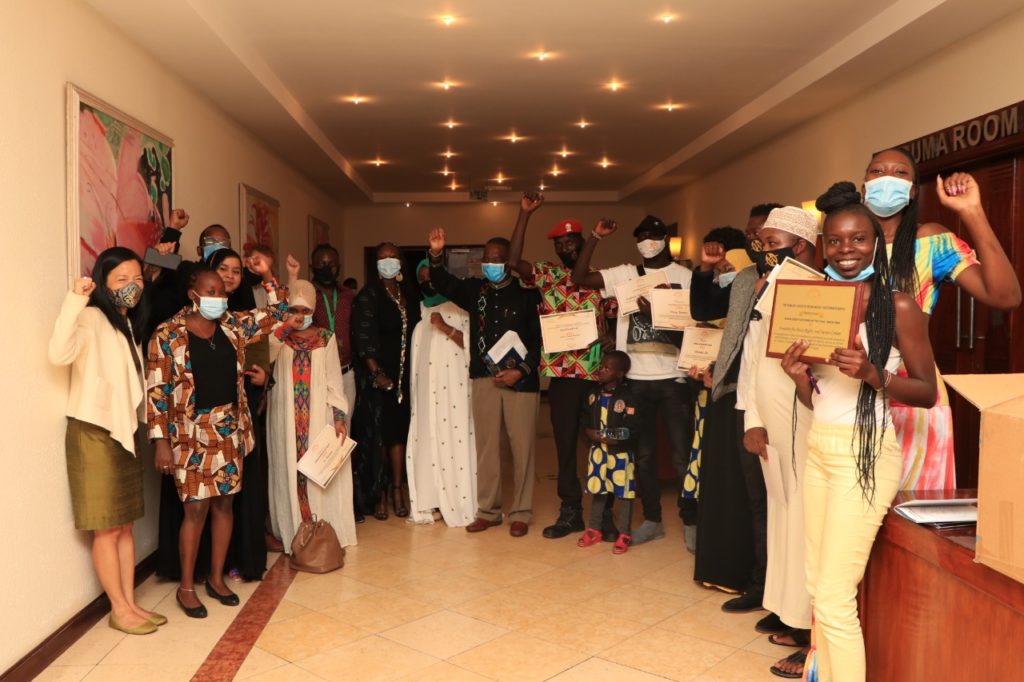
PRESS RELEASE
WINNERS OF THE 2020 HUMAN RIGHTS DEFENDERS AWARDS ANNOUNCED
27 November 2020 – Nairobi, Kenya.
The Defenders Coalition (National Coalition of Human Rights Defenders in Kenya) and the Working Group on Human Rights Defenders announced today the winners of the 2020 Human Rights Defenders awards during a ceremony held in Nairobi at Sarova Panafric Hotel.
The 2020 winners are:
For the fifth consecutive year, and chosen by an independent selection panel of eminent Kenyans, chaired by Rachael Mwikali, the three different awards were handed out to the winners for their outstanding work in the field of human rights. Some of the selection criteria included civil courage, leadership, innovation, demonstrable impact of the Human Rights Defender’s work on the community, and creativity.
“In every community, there are individuals who stand out. They defend human rights, and they do so at times under very extraordinary circumstances,” says Kamau Ngugi, Executive Director of the Defenders Coalition. Kamau further noted that the good bit is that their work is appreciated by the society, “but their work is only known to the communities around them and the areas they have had an impact across the world. The awards ceremony is a special occasion to honour those courageous individuals who do excellent work within our communities.”
The objective of the Awards ceremony is to recognize, honor and appreciate the extraordinary work of Human Rights Defenders in the protection of human rights while they face many challenges in their capacity as agents of social change and transformation. An important aim of the awards is to improve the safety and protection of Human Rights Defenders as they benefit from the visibility and international recognition.
“2020 has tested the world with a range of challenges because of the COVID-19 pandemic. The work of human rights defenders is now more important than ever – in ensuring that human rights are respected as the world combats this virus. The pandemic has affected most aspects of our lives, even the way in which we are celebrating and honouring human rights defenders together through the HRD Awards this year. The Awards enable us to express appreciation of the courage that human rights defenders have shown in a challenging context,“ Elin B. Rognlie, Ambassador of Norway to Kenya
The Awards ceremony is an initiative of the Human Rights Defenders Working Group, currently presided by the Defenders Coalition and co- chaired by Embassy of Norway in Nairobi. The Working Group brings together civil society organizations, activists and development partners to pursue the universal goal of protecting human rights and the defenders of these rights.
For more information, or interview requests, please contact:
Notes to the Editors:
Further details on the 2020 Winners:
Jerotich Seii
Jerotich is a mother, daughter, sister and auntie with a large extended family and tthese roles keep her thoroughly occupied and grounded. Simultaneously, she has spent 23 years in the professional realms of gender, human rights, development, public health, migration management and humanitarian/emergency response.
As an independent consultant, she has no corporate identity and as such, she is free to be a vocal/radical/revolutionary/incisive WHRD. Although she has been a human rights defender for long even in more restricted work environments, her HRD work came to the fore in Kenya following the 2017 elections. With a consistent focus on Energy Justice #SwitchOffKPLC, humanity.ke #HumanityKE and wider governance and anti-corruption themes, she has been able to effectively engage in public education and advocacy using social, print and electronic media; and the occasional demonstration. This is not an accidental strategy but rather a deliberate one that has allowed her to amplify a voice on behalf of WaKenya on a minimal budget.
She began the #SwitchOffKPLC campaign in January 2018 along several other WaKenya in order to challenge injustices faced by electricity consumers in the form of fraudulent/high electricity bills; vendor cartels; meter tampering; opaque tariffs and an all-round unprofessional monopoly, Kenya Power and Lighting Company. This has been greatly influenced by the fact that women bear the public health brunt that comes with using dirty energy sources for domestic work. #SwitchOffKPLC addresses these and many other concerns within the energy sector including constitutional violations and the proliferation of criminally contracted Independent Power Producers.
Turkana Red Vests Movement
This is a group of human rights defenders focused to fight corruption and unequal access to services and opportunities in both government and multinationals operating in Turkana County. Specifically, they were recognized because of their extraordinary contribution, towards the promotion and protection of economic justice, access to water and good governance.
Feminist for Peace Rights and Justice Centre
FPRJC has been working in the community since 2016 as a social movement that mobilized women in amplifying their voices for social change and later transitioned into a legal entity by registering as a community based organization (CBO) in September 2018. A group of young women activists came together to end all forms of violence, abuse and oppression against women, children and sexual minorities and champion for women’s empowerment in the community through feminist principles. Almost all the founders of FPRJC are SGBV survivors and have been on the frontline to champion for societal and attitudinal change in championing for women’s rights.
Feminist centre continued its work despite the hardship of COVID 19 pandemic by giving community hope when organizations were not working. They continued serving different vulnerable people in Kibera by providing basic needs like food, contraceptives to prevent unintended pregnancies, masks and water to the community to continue with handwashing. Feminist centre has been in the frontline documenting, reporting and condemning human rights violations that was simultaneously experienced by the community doing referrals and follow ups. The rescue centre has been a shelter and a safe space to women at Kisumu ndogo who face gender based violence at their homes.
Naila Abdalla
Meet Naila an individual who has a passion for human rights work, community empowerment, rule of law and justice. She is a mother of one and a peer mentor. As a Muslim woman, she seeks to change the narrative and break the cultural barriers that deny Muslim women opportunities to meaningfully participate in development processes to improve their well-being. She started her human rights work as a student leader in high school and after that has been volunteering in various human rights organizations.
In 2017 she founded Sisters for Justice (S4J) to give a voice to the struggles of youth and Muslim women from the Coast. Her efforts saw her organization S4J launched by senior state, non-state and international partners including Director of Public Prosecutions (DPP), Supreme Court Judge Lady Justice Njoki Ndung’u and the British High Commissioner. Her organization has since risen to become one of the leading human rights organizations at the Coast.
In her work she has empowered young Muslim women in her community whose rights have been violated to stand up and defend their rights, including: addressing women cases in court in order to seek justice for them, and following up on gender-based violence cases, extra judicial killing, violent extremism and forced disappearances. This has seen her receive threats and being demeaned by perpetrators who include both state and non-state actors. This year she has been participating in community service work including the distribution of food with Kenya Red Cross during the COVID-19 pandemic
Mathare Roots Initiative is a community-based organization located in the informal settlements of Mathare spearheading activism through art and Artivism. We have over the years created awareness on different human rights issues and violations in our community such as extra-judicial killings by the police, violence against children and women in our community and creating awareness among our community members of their different civic duties.
Mathare Roots Initiative formed in 2006 by a group of young community members and focused its work mainly on empowerment of the youths, but over the years we realized that there were inequalities hindering the empowerment of the youth. That is when they changed their approach to that of Human Rights Defenders, to fight these inequalities that over the years acted as a stumbling block for youth empowerment. One of their very successful human rights work was the Activism through graffiti mural dubbed Artivism, through this they were able to create awareness on different thematic areas including the killing of an eight-year old Yassin Juma in Huruma by the police, these murals have received widespread media attention in both local and international media agencies.
The late Mr. Abubakar Al-Amudy
The late Mr. Abubakar Al-Amudy was an environmental activist who fought for the rights of the communities of Lamu. He was a natural leader and an enthusiast of sustainable development and environmental protection. The late Abubakar Al-Amudy died on June 21, 2020 after decades of advocacy on environmental justice in Lamu County. He co-founded Save Lamu in 2011, which has led the struggle for reclaiming natural and land resource rights in Lamu County.
The late Mr. Abubakar Al-Amudy is a celebrated hero, a retired teacher by profession, role model and a vocal activist who fought many battles to stop the Lamu Coal Plant to protect his community and environment. In doing so, he protected the communities’ natural resources on which they depend for their livelihoods and protected both the environment and natural resources for the future generations.
One of his many achievements was that he co-founded Save Lamu, an organization that is committed to environmental justice and to engage communities and stakeholders so as to ensure participatory decision-making, achieve sustainable and responsible development, and preserve the environmental, social and cultural integrity of the Lamu community.
He was also instrumental in the legal battles against the Lamu Port, South Sudan, Ethiopia, Transport Corridor (LAPSSET) and the Lamu coal power plant which gave the community two landmark wins that recognized the need for adequate environmental impacts assessments for both projects, and appropriate mitigations measures to avoid significant environmental impacts of LAPSSET.
Public Choice Award
Anami Daudi
Anami is a passionate youth advocate for social change and social justice in Kenya. He describes self as an amateur that plays soccer for grassroot football. He is also a mentor and a community organizer. He started his human rights work at an early age but did not he is a human rights defender until 2015 when he started volunteering with human rights organizations.
His human rights focus areas include: gender based violence, police abuse of power, education and general human right violations. He is inspired by the rising number of young people who are coming out to defend human rights from different marginalized communities. He is the coordinator of the Mukuru Community Social Justice Centre.
In his advocacy work, he has managed to organize community members in different thematic sectors to identify problems and come up with solutions e.g environment conservation. He has brought together a group of 300 men to form a CBO to champion for ecological justice. They now own a recycling plant that has a capacity of employing 400 young people but they are yet to be connected to a three face electricity.
The 2020 Human Rights Defenders Award ceremony is hosted by the Defenders Coalition, Embassy of Norway in Nairobi, with the generous support of: Belgium Embassy, France Embassy to Kenya and Somalia, Netherlands Embassy, Germany Embassy, HAKI Africa and Embassy of Sweden in Nairobi.
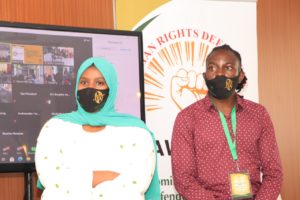



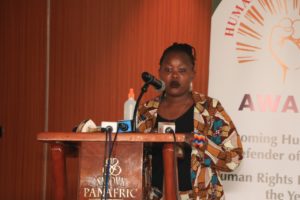
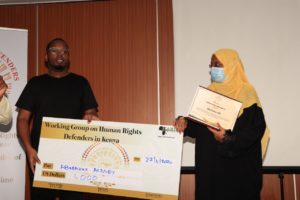
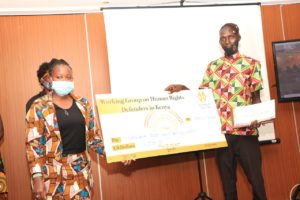
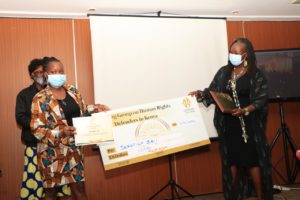
 PR
PR
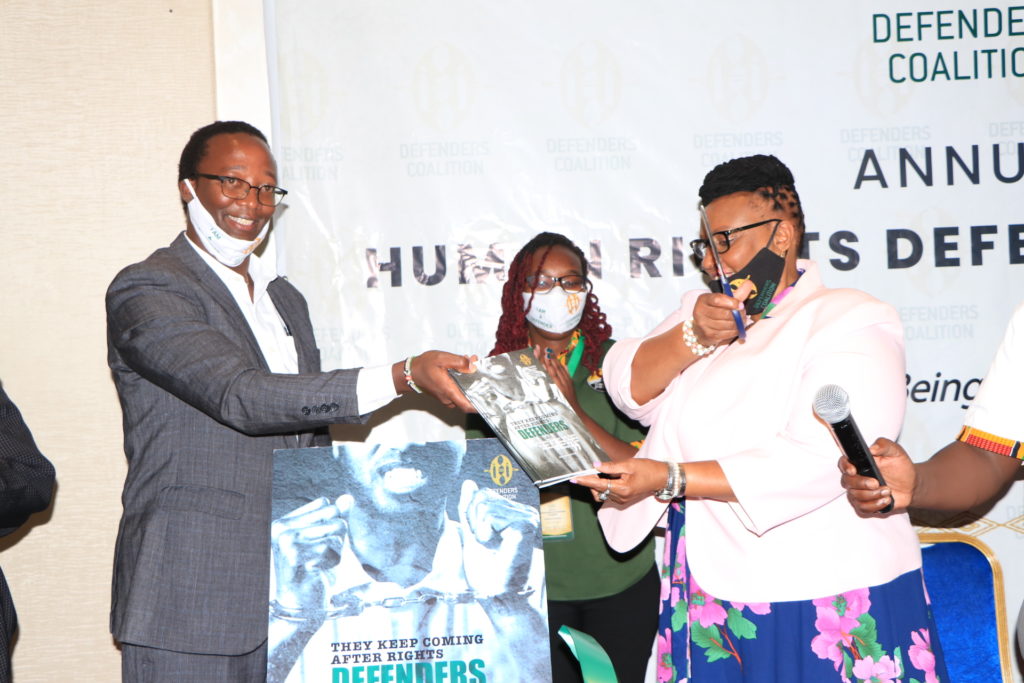
They Keep Coming After Rights Defenders
In 2016, the Defenders Coalition published the first edition of trends report and case digest on human rights defenders and the law in Kenya. The report documented trends of human rights violation against HRDs and highlighted landmark court decisions that have had an impact on the working environment of HRDs. This second publication updates the first edition of the trends report and case digest. It focuses on the major events and cases that were reported or decided during the period 2016 to 2019. Major events that impacted on the work of human rights defenders include the 2017 general elections and the terrorist attacks that occurred in Nairobi in January 2019.
The emerging trends of human rights violations that were documented during the reporting period include threats to personal safety and integrity of human rights defenders. This was epitomized by the brutal murder of lawyer Willie Kimani, his client and a taxi driver in June 2016 for pursuing justice against administration police officers who were harassing his clients. In April 2018, Evans Njoroge alias Kidero, a student activist, was shot and killed by a police officer for leading students in demonstration. In August 2018, land rights activist Esther Mwikali was killed and her body dumped in a thicket in Mithini. Robert Bundotich, a community leader from the Sengwer Community was shot dead by Kenya Forest Service officers in January 2018.
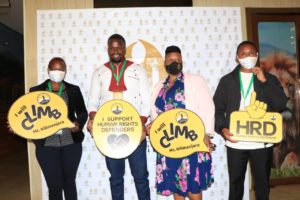
LGBTIQ rights activists have made modest progress but negative narratives against LGBTIQ community forces LGBTIQ rights HRDs to continue to operate in the shadows seriously harming the effectiveness of their advocacy efforts. During this period the LGBTIQ community went to court to challenge discriminatory laws and practices with mixed results. In the first case which was an appeal filed by the NGO Board challenging the decision of the High Court directing the Board to register an NGO that sought to advocate for the rights of LGBTIQ community, the NGO Board lost its case at the Court of Appeal. In the second case, several petitioners unsuccessfully challenged the constitutionality of sections 162, 163, and 165 of the Penal Code.
Further, the right to protest, freedom of assembly, freedom of association and freedom of expression faced severe restrictions particularly during the electioneering period. Human rights NGOs, human rights monitors, media houses, journalists and bloggers faced harassment at the hands of state regulatory agencies and policies for reporting or commenting on issues that were deemed unpleasant by the state. The war on terror THEY KEEP COMING AFTER RIGHTS DEFENDERS Case Digest on Human Rights Defenders and the Law in Kenya 9 did not spare human rights defenders either. At the community level, grassroots human rights defenders faced harassment at the hands of the police for fighting for their land rights or advocating against extrajudicial killings. On the legal front human rights defenders scored major victories in court. Criminal defamation laws in the penal code and section 29 of the Kenya Information and Communication Act were declared unconstitutional.
The report concludes with several recommendations that will improve environment in which human rights defenders in Kenya operate. It calls upon the government to enact a comprehensive legal and policy environment in line with the UN declaration on human right defenders that will secure the right to defend human rights in Kenya.
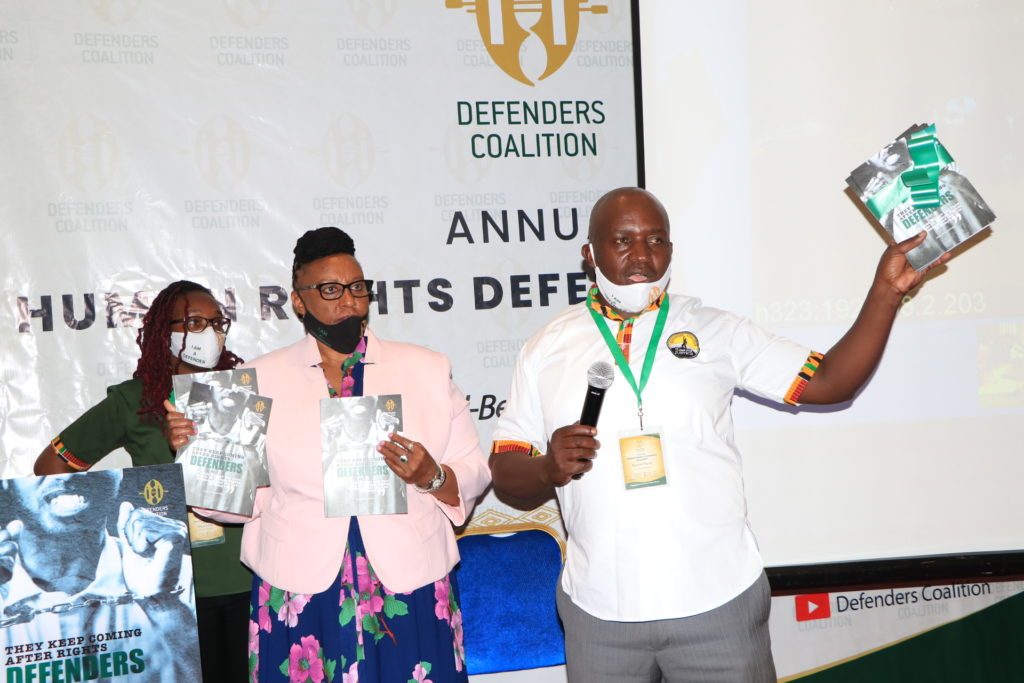
Defenders Coalition embarked on a range of solidarity, movement building and capacity enhancement efforts to deliberately promote and support those on the forefront championing and supporting the rights of others in Kenya. Below is a aummary of the activities that we have undertaken within the first week of October 2020.
Taita Taveta Paralegals needs Assessment
The Executive Director, Kamau Ngugi and Wellness Officer -Esban Muthoni paid a courtesy call to human rights defenders (Paralegals Network) in Taita Taveta County to assess their workings environment as well as assess their training needs. The county’s community based numbers have substantially grown over time, thus equally need movement consolidation and capacity enhancement in issues ranging from security management, monitoring, documentation and reporting.
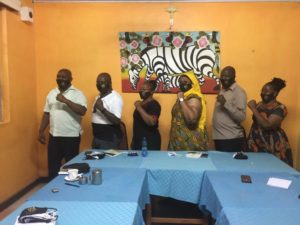
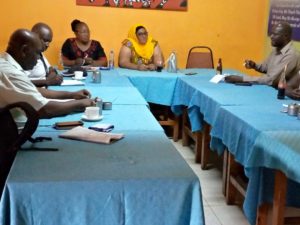
Moreover, Defenders Coalition stood with a group of 7 HRDs who have been facing charges of unlawful assembly and the case has dragged in court for close to 5 years. Taveta Law Courts magistrate, on Tuesday 6 October 2020, ruled that the accused HRDs have a case to answer on the charges and the matter is set to proceed. This is an act of the long list of punitive action by the state to intimidate, threaten and punish HRDs enjoying fundamental provision of the Constitution of Kenya, specifically Article 37 of the constitution. Defenders Coalition will follow the proceedings of the case closely to ensure that the HRDs are not subjected to undue reprisals in the process.
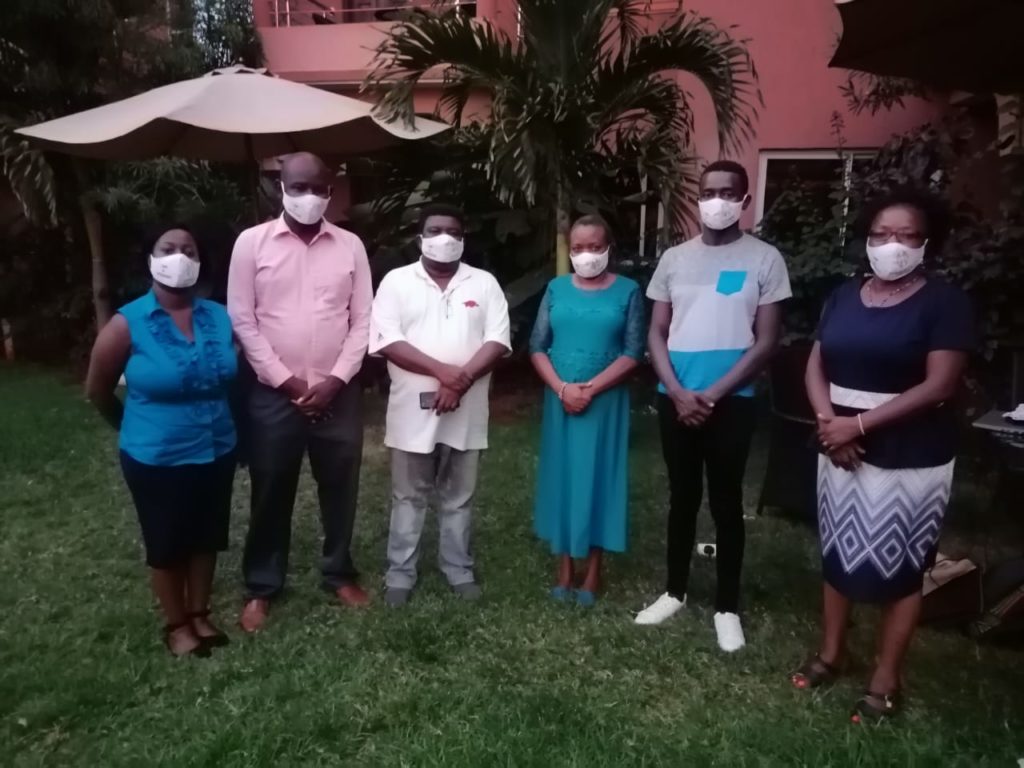
Linkages meeting between indigenous minority groups and community land rights advocates
Defenders Coalition also partnered with Indigenous People Groups in Kenya, specifically hunter gatherer communities to explore areas of synergy to establish functional linkages with civil society organizations that support and advocate for community and ancestral land rights of minority groups in Kenya.
The partnership took place in Naivasha and is intended to strike meaningful and collective championing of the rights of Indigenous People in Kenya.
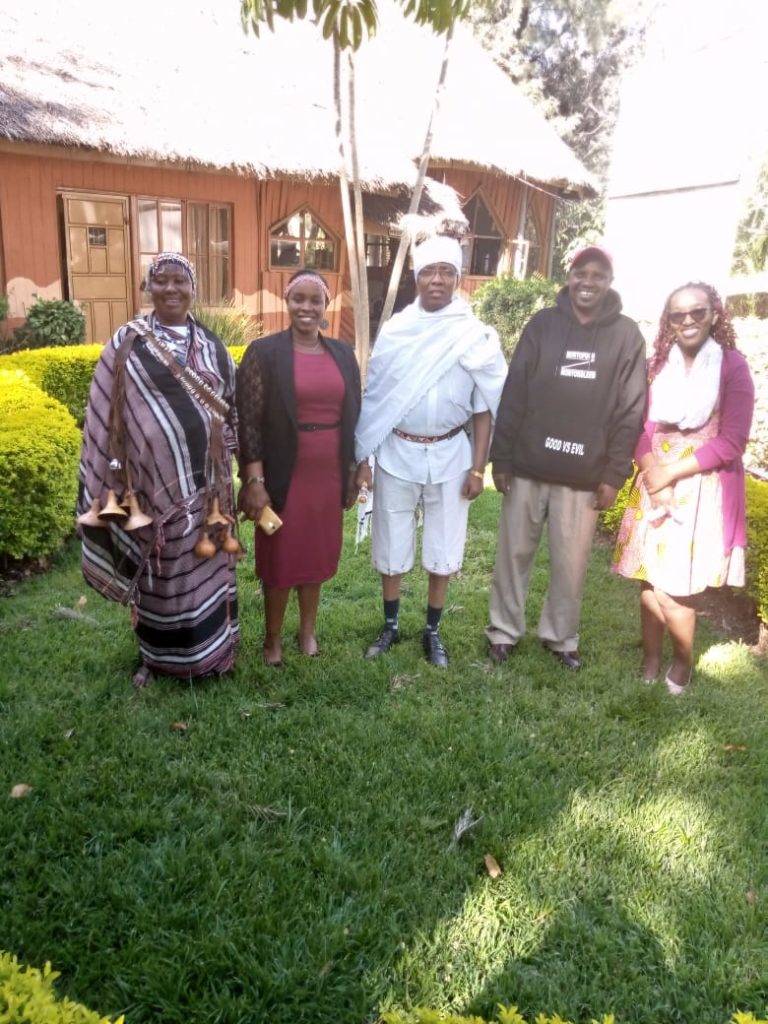
Supporting Women Human Rights Defenders sensitize young girls and mothers in Baringo County
Defenders Coalition supported Women HumanRights Defenders from Ilchamus Ward in Baringo County conduct a sensitization forum with young girls on gender based violence, that have since escalated during covid-19. The pandemic has exposed human rights defenders young girls to harmful practices that threaten the realisation of their full potential as human beings. The activity that was conducted during the eve of the International Day of the Girl Child, the forum aimed to sensitize young girls and mothers to be change-makers and offer solutions to the challenges that they face.
The platform also served to encourage young mothers to pursue education even after teenage pregnancies.
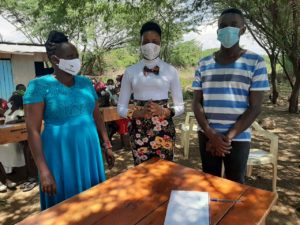
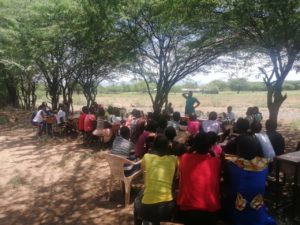
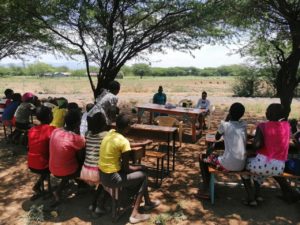
UN Human Rights Council – 45 th regular session
Item 6: Adoption of the report on the UPR of Kenya
Oral statement
Delivered by: Kamau Ngugi
Madam President,
The Defenders Coalition and DefendDefenders welcome the acceptance by the Government of Kenya of a large number of UPR recommendations. Kenya’s January 2020 review was a milestone for human rights advancement. It was also a consultative process with various stakeholders. We salute the fact that the Kenyan Government displayed political will to engage on human rights challenges, including past and ongoing violations. There have been notable instances where the human rights environment has improved since the second review. We warmly welcome Kenya’s engagement with civil society, at the national, regional,
and international levels.
We welcome Kenya’s acceptance of recommendations on:
(1) Ensuring proper, transparent, and effective investigations in cases where human rights defenders (HRDs) have been harmed, and specifically to adopt a law protecting HRDs in accordance with international standards. We recommend that Kenya implements this recommendation by domesticating the model HRD protection policy and making public pronouncements supporting the work of HRDs;
(2) Upholding the rights to freedom of expression and association, including of media organisations and HRDs, in accordance with Article 19 of the International Covenant on Civil and Political Rights (ICCPR) which Kenya is party to. We recommend that Kenya also considers the role of whistleblowers in promoting respect for human rights. We ask that the Government enacts the Whistleblowers Protection Bill 2018, reviews the Associations Bill 2018, and ensures that laws governing the operations of NGOs are in line with the right to free expression. We welcome the acceptance of recommendation 142.157;
(3) Creating a safe and enabling environment in which HRDs and civil society can operate free from hindrance and insecurity, including through the full operationalisation of the Public Benefit Organisation Act 2013. We welcome the acceptance of recommendations 142.45, 142.56, 142.162, and 142.164; and
(4) Revising and enacting the draft Data Protection Bill, particularly to create a data protection framework in line with international standards on the right to privacy. Whereas we welcome acceptance of this recommendation and note that the Act was enacted, the implementation of the guidelines is lengthy and there have been cases of privacy rights violations since January 2020, which need a recourse.
We regret that Kenya did not go a step further in its replies to ratify the Optional Protocol to the Convention Against Torture and other Cruel, Inhuman or Degrading Treatment or Punishment (OP-CAT). It is not too late, as the UPR is an ongoing process. We encourage the Government to reconsider its position on all “noted” recommendations.
Thank you.
Supporters of Climb for Justice Initiative continue to exhibit an unrelenting attitude and resilience in their pursuit for justice and a state founded on human rights. Rights Defenders, fitness enthusiasts and friends of Kenya hiked the rolling hills of Ngong on the 15th of August 2020 to celebrate the first anniversary of the campaign which was launched in 2019. One year down the line, the initiative has made giant steps towards the realization of its core objective: To raise funds for setting up a human rights defenders hub in Kenya.
Enjoy the priceless moments from the hikers on the photos below.
#ClimbForJustice
